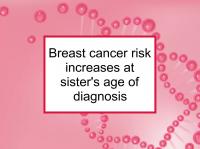Having a sister with breast cancer confers a higher risk of breast cancer even when there is no obvious family history. Women with a known family history of breast cancer are more likely to get breast cancer at a younger age than those without such a history. Like risk, prognosis appears to be partly heritable.
Women whose sisters survive breast cancer are also more likely to survive it, even adjusting for tumor characteristics. Now a new study has reported that sisters of women with breast cancer have heightened risk of being diagnosed at or near the same age the sister was diagnosed. This result holds even for women whose sisters are diagnosed at age 50 or older.
Latest research finds risk heightens around sister's age of diagnosis
The prospective study referenced above was designed to investigate whether a woman's breast cancer risk changes at or near the age her sister was diagnosed with breast cancer. The study included 23,145 sisters. To conduct the study, the authors estimated the risk of breast cancer when participants were near their sister's age of diagnosis. They then compared this to the risk of similarly aged women whose sister was diagnosed at a very different age. The authors analyzed the data for women who were 50 or older separately in order to adjust for a potential correlation due to young-onset familial breast cancer. The women were followed for a median of 9.5 years.
A total of 1,412 of the women were diagnosed with breast cancer during follow up. Participants of a given age were found to have 1.8 times the risk of breast cancer at or near their sister's age at diagnosis compared with those whose sisters were diagnosed at a substantially different age. The results held for women who were 50 or older.
The authors conclude that there may be common genetic and/or early life risk factors that influence the timing of familial breast cancer, even when onset is late in life. Breast cancer screening decisions might benefit from taking into account the age at which any sister was previously diagnosed with breast cancer, according to the authors.
Please see our article on familial breast cancer for more information.
